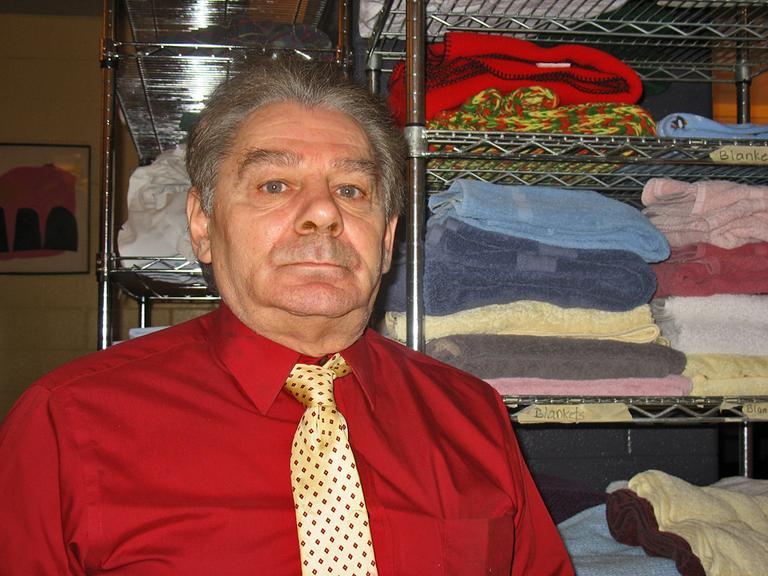Advertisement
Harvard Shelter Helps Homeless, Teaches Students Compassion
ResumeIt’s the most interesting class not offered at Harvard University.
In the basement of this city's University Lutheran Church, students who work at the Harvard Square Homeless Shelter learn compassion — and a new way to see the world.
More than 150 student-volunteers staff the shelter. It's open every night for five months over the winter. They work in shifts — stocking supplies, helping homeless people find services, serving meals. Dinner is always leftovers from Harvard's dining halls.
"A lot of the new volunteers, myself included, come in expecting to give or to teach something and actually I’d say it ends up more towards the other end."
Harvard student Kristen Cronon
On one recent night, the menu included pasta, quiche, potatoes and rice, according to Jacob Cedarbaum, a junior pre-med student from Evanston, Ill.
"Volunteers go out with a shopping cart that we acquired a ways back and they push it through the streets of Cambridge, over to the dining halls, and pick up the food there," Cedarbaum said.
Before coming to Harvard, Cedarbaum says he'd never spoken with a homeless person. Now he looks forward to the debates he gets into with some guests. He recalls one about President Obama’s health care law.
"He was up on current events and it really challenged, like, a lot of my preconceived notions — I think a lot of people's notions," Cedarbaum said. "These are people who are as smart, if not smarter, than me in some ways."
Kristen Cronon is an Art History major who's been volunteering since her freshman year.
"A lot of the new volunteers, myself included, come in expecting to give or to teach something and actually I’d say it ends up more towards the other end," Cronon said. "I am receiving or learning when I’m in the shelter."
Working at the shelter changes students' lives, says Scott Seider, a former volunteer who now teaches education at Boston University and is the author of the new book, “Shelter: Where Harvard Meets the Homeless.”
"As a result of not being professionals and not being fully-formed adults, they have the opportunity to learn a tremendous amount from the experience and what’s very important is that the guests staying at the shelter realize that," Seider said. "They have something to contribute to the learning and development of the college students working here."
The shelter's 24 beds are awarded on a lottery system and visitors can use them for up to two weeks. Cronon showed off the bunk beds in the men's area. On the way we passed the supply closest where toiletries — toothpaste, socks and underwear — are given out to guests on a weekly basis.
Cronon said in the men's sleeping area, "You can see how they make their nests and often time when they are cleaning up we'll find plates of food and mugs with hot chocolate; people were nesting up with their bed."

But she admits it doesn't look much different from her dorm room, "especially during finals."
As Cronon struggles with final exams, many of the homeless men and women are dealing with larger crises. One former guest remembers what he was going through more than a dozen years ago when he came to the shelter.
"My whole world was gone — what I got up for in the morning, what I lived for," said George Caponigro. In one year, Caponigro's mother died, his business collapsed, and his wife and children left him.
Caponigro had bipolar disorder and recognized he was an alcoholic. He spent three years living on the streets of Boston, mostly outside on Boston Common.
"I found it so ironic that I lived in public all day, every day, but I left so invisible," he said.
But at the Harvard Square Homeless Shelter, Caponigro felt respected and valued.
"There is a feeling and I found it pre people coming into the shelter: 'Yeah, these are rich kids, they are spoiled.' Of course there is some of that out there, until they come here and stay," he said.
The students helped Caponigro get a job cooking in the dining halls.
"It led to me going from living on Boston Common to being on the Board of Directors of HomeStart, the lead agency for homelessness in Massachusetts," Caponigro said.
The Harvard Square shelter, which is funded by the state and donations, recently added a Street Team. Students go out into the square every night to deliver food, clothing and blankets to people who choose not to come in.
Over the holiday break, some students stay to keep the shelter going. On Christmas, guests receive gifts of socks and gloves. And the shelter is open all day so they can stay inside... at a time that for many is a reminder of what they've lost.
This program aired on December 23, 2010.